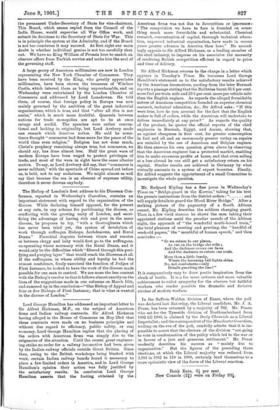Mr. Rudyard Kipling has a fine poem in Wednesday's Times
on "Bridge-guard in the Karroo," taking for his text the prosaic instructions from the district orders • " and
will supply details to guard the Blood River Bridge." After a striking picture of the pageantry of a South African sunset, Mr. Kipling describes the soldiers changing guard. Then in a few vivid stanzas he shows the men taking their
appointed stations amid the peculiar sounds of the African night, the approach of "the wonderful north-bound train," the brief pleasure of meeting and greeting, the "handful of week-old papers," the "mouthful of human speech," and then concludes :— " So we return to our places, As out on the bridge she rolls ;
And the darkness covers our faces
And the darkness re-enters our souls.
More than a little lonely, Where the lessening tail-lights shine.
No, not combatants—only Details guarding the line !"
It is comparatively easy to draw poetic) inspiration from the
shock of battle. It is a far more arduous and more valuable achievement to enlist sympathy for the obscure but faithful workers who render possible the dramatic and decisive strokes of modern warfare.






































 Previous page
Previous page